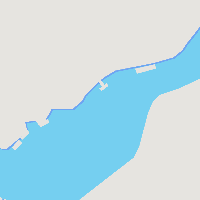The data and charts above provide the tide time predictions for St. Paul Island for July 2025, with extra details provided for today, Tuesday July 1, 2025.
What are Tides?
The tides are very long waves that move across our oceans, and they are caused by the gravitational pull from the moon and, to a lesser extent, the sun.
When the highest point of the wave (also known as a crest) reaches a coastline, the coast experiences what we call a high tide. At the lowest point (also known as a trough) reaches the coast, we experience a low tide.
Tidal forces of the moon in the open ocean will form as bulges of water that face the moon, but around land mass and coast lines, the water is able to spread out onto land, which creates the tides.
Earth's tides change based on the gravitational pull of the moon as it orbits us. The gravitational pull of the moon is strongest on whichever side of the Earth is facing it, annd gravity pulls the oceans towards the moon, resulting in a high tide.
On the opposite side of Earth, the bulge is caused by inertia. The water moving away from the moon is able to result the gravitational forces trying to pull it in the opposition direction because the gravitational pull is weaker on the far side of Earth. Inertia wins, and this caused the ocean to bulge out and create a high tide.
As the Earth spins, different locations on the planet will face the moon, and this rotation is what allows the tides to cycle around the planet.
Types of Tides
There are two types, or extremes, of the tide. These are called the spring tide (also known as the King tide) and the neap tide. These tide types occur twice every month.
Neap Tides
When we experience a low tide, the Moon is facing the Earth at a right angle to the Sun. This means that the gravitational pull of the Moon and Sun actually work against each other. We call these tides neap tides, and it's when the difference between high and low tide is at its lowest.
A neap tide happens between two spring tides, twice a month when the first and last quarter Moon appears.
Spring Tides
When we experience a high tide, the Earth, Moon, and Sun are in alignment, and this creats a strong gravitational pull. A spring tide is when the high and low tide difference is at it's most extreme, the highest and the lowest tides of the month.
Tide Predictions for St. Paul Island
Our tide prediction model for St. Paul Island uses harmonic constants and the nearest available coordinates along with the Lowest Astronomical Tide (LAT) to define the chart datum.
Tide times and heights may not be 100% accurate and they also do not account for local weather conditions. We built this tool out of a love for tides and astronomical calculations but it is not intended to be used for navigation or any purpose where you would need to rely on the data being accurate.
If there are any errors or problems you find with the tide data for St. Paul Island (or any other tidal station) please let us know.




